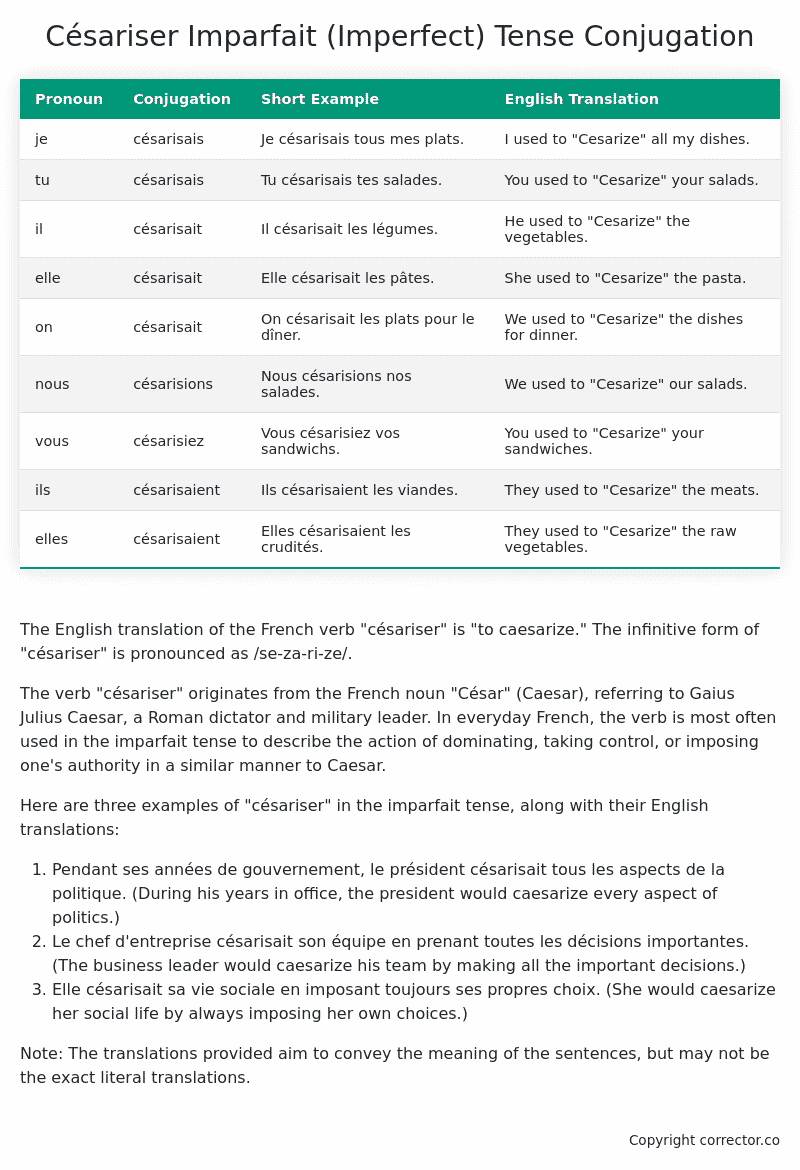Imparfait (Imperfect) Tense Conjugation of the French Verb césariser
Introduction to the verb césariser
The English translation of the French verb “césariser” is “to caesarize.” The infinitive form of “césariser” is pronounced as /se-za-ri-ze/.
The verb “césariser” originates from the French noun “César” (Caesar), referring to Gaius Julius Caesar, a Roman dictator and military leader. In everyday French, the verb is most often used in the imparfait tense to describe the action of dominating, taking control, or imposing one’s authority in a similar manner to Caesar.
Here are three examples of “césariser” in the imparfait tense, along with their English translations:
- Pendant ses années de gouvernement, le président césarisait tous les aspects de la politique. (During his years in office, the president would caesarize every aspect of politics.)
- Le chef d’entreprise césarisait son équipe en prenant toutes les décisions importantes. (The business leader would caesarize his team by making all the important decisions.)
- Elle césarisait sa vie sociale en imposant toujours ses propres choix. (She would caesarize her social life by always imposing her own choices.)
Note: The translations provided aim to convey the meaning of the sentences, but may not be the exact literal translations.
Table of the Imparfait (Imperfect) Tense Conjugation of césariser
| Pronoun | Conjugation | Short Example | English Translation |
|---|---|---|---|
| je | césarisais | Je césarisais tous mes plats. | I used to “Cesarize” all my dishes. |
| tu | césarisais | Tu césarisais tes salades. | You used to “Cesarize” your salads. |
| il | césarisait | Il césarisait les légumes. | He used to “Cesarize” the vegetables. |
| elle | césarisait | Elle césarisait les pâtes. | She used to “Cesarize” the pasta. |
| on | césarisait | On césarisait les plats pour le dîner. | We used to “Cesarize” the dishes for dinner. |
| nous | césarisions | Nous césarisions nos salades. | We used to “Cesarize” our salads. |
| vous | césarisiez | Vous césarisiez vos sandwichs. | You used to “Cesarize” your sandwiches. |
| ils | césarisaient | Ils césarisaient les viandes. | They used to “Cesarize” the meats. |
| elles | césarisaient | Elles césarisaient les crudités. | They used to “Cesarize” the raw vegetables. |
Other Conjugations for Césariser.
Le Present (Present Tense) Conjugation of the French Verb césariser
Imparfait (Imperfect) Tense Conjugation of the French Verb césariser (You’re reading it right now!)
Passé Simple (Simple Past) Tense Conjugation of the French Verb césariser
Passé Composé (Present Perfect) Tense Conjugation of the French Verb césariser
Futur Simple (Simple Future) Tense Conjugation of the French Verb césariser
Futur Proche (Near Future) Tense Conjugation of the French Verb césariser
Plus-que-parfait (Pluperfect) Tense Conjugation of the French Verb césariser
Passé Antérieur (Past Anterior) Tense Conjugation of the French Verb césariser
Futur Antérieur (Future Anterior) Tense Conjugation of the French Verb césariser
Subjonctif Présent (Subjunctive Present) Tense Conjugation of the French Verb césariser
Subjonctif Passé (Subjunctive Past) Tense Conjugation of the French Verb césariser
Subjonctif Imparfait (Subjunctive Imperfect) Tense Conjugation of the French Verb césariser
Subjonctif Plus-que-parfait (Subjunctive Pluperfect) Tense Conjugation of the French Verb césariser
Conditionnel Présent (Conditional Present) Tense Conjugation of the French Verb césariser
Conditionnel Passé (Conditional Past) Tense Conjugation of the French Verb césariser
Conditionnel Passé II (Conditional Past II) Tense Conjugation of the French Verb césariser
L’impératif Présent (Imperative Present) Tense Conjugation of the French Verb césariser
L’impératif Passé (Imperative Past) Tense Conjugation of the French Verb césariser
L’infinitif Présent (Infinitive Present) Tense Conjugation of the French Verb césariser
L’infinitif Passé (Infinitive Past) Tense Conjugation of the French Verb césariser
Le Participe Présent (Present Participle) Tense Conjugation of the French Verb césariser
Le Participe Passé (Past Participle) Tense Conjugation of the French Verb césariser
Struggling with French verbs or the language in general? Why not use our free French Grammar Checker – no registration required!
Get a FREE Download Study Sheet of this Conjugation 🔥
Simply right click the image below, click “save image” and get your free reference for the césariser imparfait tense conjugation!

Césariser – About the French Imparfait Tense
NOTE: To take a deep dive into all the French tenses then see our article on Mastering French Tense Conjugation.
Formation of the Imparfait Tense
For regular -er verbs:
For regular -ir verbs
For regular -re verbs
Common Everyday Usage Patterns
Description of Past Habits
Background Information
Mental and Emotional States
It’s employed to express emotions, thoughts, or physical sensations in the past. For example: “J’étais content quand il est arrivé.” (I was happy when he arrived.)
Ongoing Actions
Points to Note About the Imparfait Tense
Passé Composé vs. Imparfait
Conditional
Si Clauses
Narration
I hope you enjoyed this article on the verb césariser. Still in a learning mood? Check out another TOTALLY random French verb imparfait conjugation!


